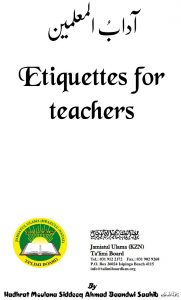السَّلاَمُ عَلَيْكُمْ وَرَحْمَةُ اللهِ وَبَرَكَاتُهُ
It’s Saturday 21st November 2020.
Let’s continue with the topic of Teachers today (Part 1).
The 4 minute video, shared in Part 1, has a very powerful message. Each and every child will come to school or Madrasah from a different situation and circumstance at home. This is a key point for teachers to understand.
If you look at each child as your own child, then your dealing with that child will be very different. Children need love and affection, and a very warm welcoming atmosphere in the class. Having been in the (Madrasah) teaching field for over 20 years, including 10 years as a principal and teacher, I became a very different teacher when my son enrolled at the Madrasah.
These young children start Madrasah at the age of 5, and they will have, most probably, started full time school at the same time. From 9am to 3pm they receive love, care, cuddles and smiles. Come 5pm, they start crying. Why? What has changed?
A parent recently mentioned to me that his child came home from Madrasah, and complained of aches and pains in the morning. Apparently, the Madrasah teacher had told all the children to sit in the at-Taḥiyyāt (Tashahhud) position for 2 hours. While praying Maghrib in a Masjid just before lockdown, all I heard during the 3 rak’āt, was screaming children. The teacher probably thought the louder the children pray, the better. What about their voice boxes?
Forcing children to remain standing, sometimes for over an hour. Why? Constant shouting and screaming. Why? No wonder children hide behind mum when they see their Molvisāb (teacher). I hope these practices are not prevalent anymore.
In my very early days studying at the Madrasah (late 1970s), a very close friend noticed an amazing thing. He asked me, ‘Have you noticed that our Molvisāb is very angry on Mondays and very happy on Fridays?’ I couldn’t figure it out. He said, ‘Monday is the first day of the week and Friday is fees day.’
So come on my fellow teachers, Mu’allims and Mu’allimāt, let’s get our act in order. I am not painting everyone with the same brush. We have some wonderful examples and role models, مَا شَآءَ الله. However, many are still new to the system. Get yourself trained up.
Finally, I will never forget the day when one of the Mu’allimāt I had employed (around 10 years ago), and allocated the eldest girls class to, after her first year of teaching, came and requested if I would give her the new starters class the following year. I couldn’t believe it, because every teacher wants a higher class. Here, I had an Āpā asking for the opposite.
Since that day, we have had an Āpā teaching the first class. New starters run to Madrasah and Āpā.
Almighty Allāh give us the ability to fulfil the trust placed upon us as teachers, to ensure we give each and every child the best and most positive start in life, Āmeen.
Just before I finish, no favourites please. Treat each child equally.
جَزَاكَ اللَّهُ خَيْرًا
Request for Du’ās
وَالسَّلَامُ Hanif Dudhwala
Supplementary Resources
The Legacy of the Madrasah – Hadrat Mawlānā Muḥammad Saleem Dhorāt hafizahullāh
The Way Ahead – Being a Maktab Teacher – Maulana Irfan Sidyot
Ustādh kā Talabah ke Sāth Husne Sulūk (URDU) – Hadrat Mawlānā Muḥammad Saleem Dhorāt hafizahullāh
Etiquettes For Teachers – Moulana Siddiq Ahmed Bandwi رَحْمَةُ الله عليه
